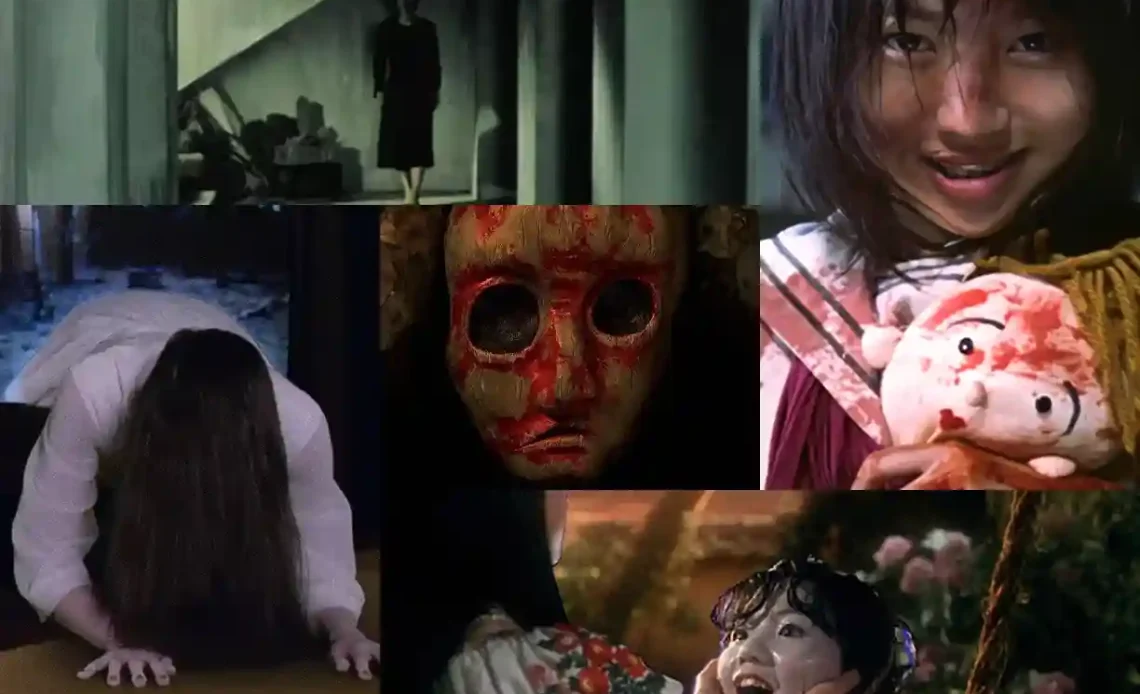
Japanese horror is one of the most terrifying genres in the film and horror industry. Its intense visual effects, suspenseful narrative, and unique backstories guarantee a thrilling ride. The curated list of 5 Japanese horror films comes from a Japanese movie buff who personally recommends them. They mostly revolve around the supernatural and the psychological.
The 5 scariest Japanese horror films that you will lose sleep over
Pulse (2001)
Pulse is a dark and bleak Japanese film directed by Kiyoshi Kurosawa. The Japanese title literally translates to “Circuit,” a reference to the centre of horror in the film—the Internet. Japan’s horror films have a trend of techno-horror, mostly cautionary tales of electronic usage. Pulse is a classic example of this. The film also explores isolation and helplessness as the ghosts invade Tokyo and more people begin disappearing. The film gained a cult following worldwide, and its popularity granted it an American remake by Wes Craven. The seemingly disconnected stories begin to thread into a complicated and impossibly tragic story.
Ring (1998)
This list wouldn’t be complete without Ring. The original always beats the American remakes, and Sadako’s story is infinitely more sinister. In another techno-horror film, Hideo Nakata introduces the curse of a videotape. Nakata couldn’t have predicted how big Ring would be, but its influence is still felt today. The investigation behind the cursed tape reveals Sadako’s tragedy and why the tape has so much power. The film follows the leading couple trying to save their son from the curse, unveiling themes of parental love, technological advancements, and abuse. It gained a cult following, hailed as one of the most terrifying films, and also has several American remakes.
Battle Royale (2000)
This brutal and unforgiving film has one of the most groundbreaking concepts in the industry. Quentin Tarantino covets it as his favourite film of the 21 st century. Battle Royale has an immense amount of violence, with scenes too grotesque to watch with both eyes open. It also has some of the most psychotic characters in the history of horror. However, it’s a rather timely topic. The film revolves around Japanese high schoolers forced into fighting to death by a Japanese totalitarian government. Directed by Kinji Fukasaku, Battle Royale was the high-grossing Japanese film for 6 weeks straight.
Noroi: The Curse (2005)
In the world of Japanese horror, nothing has frightened them more than demonic entities. Japanese mythology involves several types of demons and Noroi: The Curse has one of the best possession stories in the genre. Following Masafumi Kobayashi, the paranormal investigator gets more than he bargained for. The main villain, Kagutaba, is visually horrifying yet memorable. An interesting choice by Kōji Shiraishi, the director, was to involve the actress Marika Matsumoto as herself in the film.
House (1977)
This film has one of the most unique narratives in the genre. House is an experimental film in the horror-comedy subgenre. While the film did negatively in Japan, its global release in 2009 brought it a cult following. Nobuhiko Obayashi’s fresh and distinct style enhances the crazy narrative of the film. He draws inspiration from his daughter, Chigumi, who drew from childhood fears. It never goes how you expect and that’s exactly how horror should be – the unpredictable. Obayashi nails the unpredictable part of horror with House. The visuals and use of colours are a delight to anyone looking for a fun experience over being scared.
Related articles:

